Ever since the fictitious Corleone clan was introduced to the big screen in The Godfather in 1972, the town of Corleone in Sicily has been synonymous with organised crime.
When Don Vito’s son Michael, played by Al Pacino, was sent to Sicily in exile, the murder of his new bride, Apollonia, captured the ruthless brutality of Italy’s Cosa Nostra, which always seemed to lie beneath the surface, even in the idyllic Sicilian countryside.
This week, the resilience of Italy’s most pernicious problem – the mafia – was exposed once again when it was announced that Corleone’s town council was being dissolved by the order of Rome because it had been infiltrated by organised crime. Three other municipal governments in southern Italy were also disbanded under a decree signed by the Italian prime minister, Matteo Renzi.
The decision followed an investigation by Italy’s interior ministry, which found that individuals believed to be connected to the mafia had been hired by the town council, and that public contracts had been awarded to suspected mafia businesses.

Local reports also pointed to intercepted phone conversations in which members of the mafia specifically mentioned the brother of the now-former mayor Lea Savona, saying he was considered an important friend to a loyalist of the notorious former crime boss (now in prison), Salvatore ‘Totò’ Riina.
Corleone was in the news earlier this summer when a religious procession through the streets stopped in front of Riina’s house in an apparent sign of respect to the former boss’s wife, Ninetta Bagarella.
“The move to dissolve the council tells us that the problem has not gone away, despite all the talk that the Cosa Nostra’s Calabrian cousins are the most important element in organised crime,” said Federico Varese, a professor of criminology at Oxford University.
For about two decades, since the murder of two Sicilian judges in 1992 so shocked Italians that it was said to have put the mafia on the back foot, most of the world’s attention has focused on organised crime in the southern Italian region of Calabria, where the ’Ndrangheta syndicate is a key player in global drug trafficking.
But Varese said the dissolution of the Corleone municipal government – a serious move by the national government, tantamount to the suspension of normal democratic practices – proved that the Cosa Nostra still had a firm grip on local politics and public contracts.
“It was an inevitability, but I’m not happy,” Dino Paternostro, an anti-mafia activist and journalist, told local reporters. “Because of the administrators’ inability to resist collusion with the mafia, the city of Corleone has been put back 30 years. It is a painful moment for many honest citizens of Corleone, who have nothing to do with the mafia.”

Corleone is not only an important town because it has a place in one of the most famous movies of all time. It was also the birthplace of Riina and Bernardo Provenzano, the two mafia bosses who took control of the Cosa Nostra in the 1980s and engaged in a bloody battle that killed hundreds of people. Their murderous destruction of the competing Palermo-based clan made Corleone the capital of Sicilian illegality.
Riina is in a high-security prison and Provenzano, who was known as “the tractor” for the way he mowed down his victims, died last month.
While more than 200 city governments have been dissolved since 1991, this week’s move marked the first time Corleone’s council has been disbanded. Experts such as Varese said Rome should be commended for taking action, but he added that he did not expect the move to be particularly effective.
Disbanding local councils was a way to single out alleged criminality in the political class, he said, but it did not root out corruption among ordinary bureaucrats who are connected to organised crime, wield tremendous influence and maintain their jobs.
Other cities whose administrations have been disbanded include Arzano, near Naples, and Bovalino and Tropea, two towns in Calabria.

Comments (…)
Sign in or create your Guardian account to join the discussion